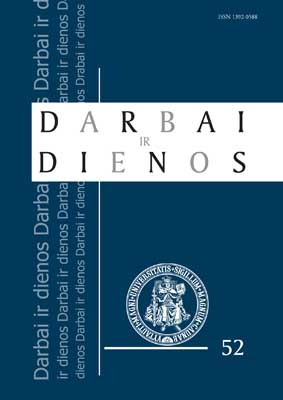Kultūrinio ir religinio gyvenimo sovietų Lietuvoje istoriniai tyrimai: šaltinių keliamos problemos
Historical Investigations of Cultural and Religious Life in Soviet Lithuania: Problems with the Sources
Author(s): Arūnas StreikusSubject(s): Cultural Essay, Political Essay, Societal Essay
Published by: Vytauto Didžiojo Universitetas
Keywords: Soviet Lithuania; culture; religion; confidential documents; sovietmetis; kultūra; religija; slapti dokumentai;
Summary/Abstract: Didžioji dalis prisiminimų apie sovietmečio kultūrinį ir religinį gyvenimą yra akivaizdžiai politiškai angažuoti ir retrospektyviai siekia pateisinti tam tikrą laikyseną, todėl labiau tinka posovietinės visuomenės sąmoningumo tyrimams. Išlikę ir istorikams prieinami dienoraščių ar epistolinio žanro liudijimai apie sovietinio laikotarpio kultūrinio ir religinio gyvenimo atmosferą taip pat nėra gausūs. Išeitis iš susiklosčiusios situacijos galėtų būti gerai parengti interviu su žmonėmis, kurių kultūrinio ir religinio gyvenimo patirtis būtų kuo įvairesnė. Sovietinė periodinė spauda, ypač kultūriniai publicistiniai žurnalai, kol kas nepakankamai panaudojami tyrinėjant sovietų kultūros politiką. Prakalbinti sovietinę praeitį, žinoma, gali padėti ir naujos teorinės prieigos, bet tai jau kito svarstymo tema. The article deals with the sources that could be used to reconstruct adequately the atmosphere of cultural and religious life in Soviet Lithuania. The group of documents reflecting activities of state bodies is the most abundant but it doesn‘t reveal deeper processes which were going on in those spheres. These documents mostly fix decisions already taken while leaving their motivation in the dark. The second deficiency of documents of this type is their ideologically codified language which it is difficult to interpret adequately. Moreover, many condidential documents were destroyed by the retreating Soviet authorities, and due to this there are quite extensive “white gaps” in the field. The majority of memoirs about cultural and religious life during the Soviet rule are also of a little use because of their strong political motivation. Meanwhile, existing diaries as well as letters reflecting the atmosphere of cultural and religious life in Soviet Lithuania are very few. Qualified interviews with former participants in the cultural discourse could constitute a way out of this situation as well as an introduction of new theoretical tools.
Journal: Darbai ir dienos
- Issue Year: 2009
- Issue No: 52
- Page Range: 75-83
- Page Count: 9
- Language: Lithuanian

